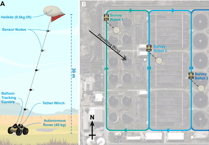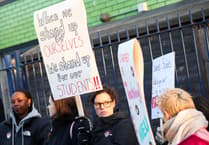MAY could seem even merrier, knowing that it is perfectly OK not to mow the lawn this month.
In 2019, the conservation charity Plantlife started the No Mow movement, which allows spring plants a chance to set seed before the first cutting, leading to healthier, more diverse lawns.
More flowering plants leads to more insect life, including vital pollinators. After last year’s drought many people re-thought their lawns. Horrified to see them resemble Saharan sand and not permitted to water them, they eventually sighed with relief when, at last, the rains came and the lawns grew afresh.
This was a warning on several fronts. I shall not go into the problems of global warming, but point out that lawns which had not been neatly shaven almost to their roots were the ones which survived. Here we are in May and my lawn has been mown but once. And gloriously green and lush it is.
I recently visited the lawn of a holidaying friend who nominally employs a gardener to keep the lawn looking like a bowling green.
Within a week of “neglect” it has become a haze of purple and blue and looks beautiful. I think I should photograph it to show on the owner’s return and thus, perhaps, encourage him to allow his green sward to stay green, come hell or high temperature.
I was delighted to see the churchyard at St Mary’s in Horsell had suddenly become a wildflower meadow with bluebells and buttercups and slender grasses swaying in the breeze. Quite lovely.
Then I noticed men with mowers and strimmers. I hurriedly pointed out to them that this is No Mow May. They said they were not going to mow it all – just bits.
I have nothing against paths being mown through long grass, but still... the thought of all those flowers and grasses cut down before their time. The churchyard is surely an apt place to recall the words in the funeral service about having a short time to live and being cut down like a flower. But please spare the flowers until they have gone to seed.
When I saw some council workmen who looked threatening – to plants – armed with strimmers and mowers, I asked them about No Mow May. They’d never heard of it.
Plantlife’s campaign is taking a long time to soak down to the grass roots. Perhaps the workmen did know of it and would be happy to lay down their weapons of mass plant destruction. If they did, their bosses – the council – might complain. But would they?
I have just received the latest news and local information bulletin from Woking Borough Council, and in it is the suggestion “Let your lawn grow this No Mow May to provide a habitat for wild flowers and animals”.
All local councils have been contacted over the years by Plantlife in its efforts to safeguard wildflowers. Is there any local council which would naysay the idea of allowing wildflowers to proliferate?
I understand that tall plants at road junctions should be kept in short order so sight lines are not disrupted or road signs hidden. But all those intriguing little bits of green land around the borough? Let sleeping dogs lie, including dog violets and dog roses.
I have read that this year, for the first time, a third of the gardens on display at the Chelsea Flower Show will feature weeds. One thing I would alter to that comment: change “weeds” to “wildflowers”.
A garden for the Royal Entomological Society will feature bramble, thistle and knapweed. Tom Massey, who is creating the garden, regards the “weeds” as resilient plants.
In Sir David Attenborough’s recent television series Wild Isles, he highlighted that this country has lost some 97% of its wild meadows and some of the much-loved wildflowers of our childhood – that’s the childhood of those only just out of it, not just the more mature of us – are now on the Near Threatened lists. Such old favourites as ragged robin, field scabious and devil’s-bit scabious are disappearing.
Let not this discussion on leaving lawns to go wild lead to a, literal, turf war. Matthew Pottage, head curator at RHS Wisley, said the subject was becoming too aggressive.
He is quoted, in The Daily Telegraph, as saying: “If somebody wants to mow their lawn and have bedding plants, and they’re getting enjoyment out of gardening, brilliant. Let them do it. It is better than paving over your front garden.”



